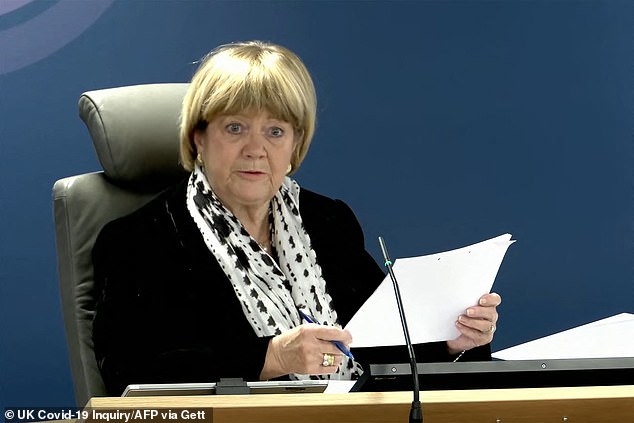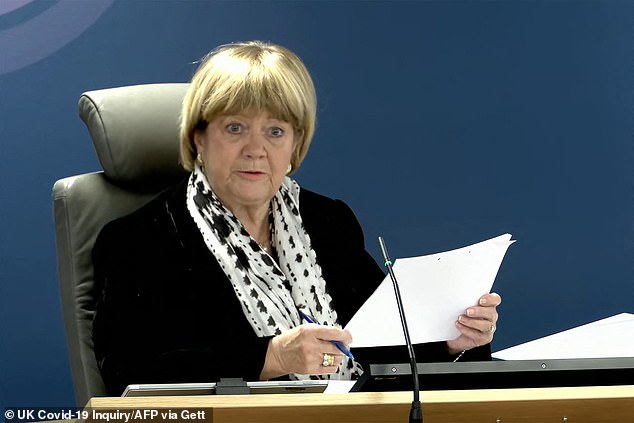Covid was worse than it should have been due to lack of pandemic preparation, damning study concludes



The human and financial costs of the Covid pandemic were far higher than they should have been because the UK was ill-prepared, a damning report concluded today.
Baroness Heather Hallett, chair of the Covid-19 inquiry, presented her first report into the pandemic, highlighting the serious lack of preparedness and resilience that has allowed the virus to sweep through communities and overwhelm the NHS.
She said the UK had prepared for the “wrong type” of pandemic – a flu virus, rather than pandemics caused by other respiratory diseases, such as Covid, which require a completely different approach.
She set out a list of recommendations for the new Labour government, warning: ‘It is not a question of if there will be another pandemic, but when.’
And she urged that the problem be taken seriously, “in the same way we treat a threat from a hostile state.”

Baroness Heather Hallett, who chaired the Covid-19 inquiry, highlighted the serious lack of preparedness and resilience that allowed the virus to sweep through communities and overwhelm the NHS
The UK faced “major failings” when the pandemic hit in early 2020, with schools, offices and shops closed, freedoms severely curtailed by lockdown measures and untold damage to mental health.
By the end of 2023, there had been more than 235,000 deaths from Covid-19 in the UK.
She acknowledged that preparing for a pandemic costs money, but warned: “The enormous financial, economic and human costs of the Covid-19 pandemic prove that money spent on systems to protect us is critical in terms of preparedness and resilience, and that the costs of not doing so are more than offset.”
‘If the UK had been better prepared for the pandemic and more resilient to it, some of those financial and human costs might have been avoided.’
She said the UK was more vulnerable due to high levels of heart disease, diabetes, respiratory disease and obesity, and overall levels of ill health and health inequalities.
But, on the state’s preparedness, she added: “There must be a radical reform. Never again must a disease lead to so many deaths and so much suffering.”
She said planning and guidance were “insufficiently robust and flexible”, that policy documentation was “outdated, unnecessarily bureaucratic and contaminated by jargon” and that advice was “often undermined by groupthink”.
She also acknowledged that the government’s preparedness and resilience were “clearly under constant pressure” as the pandemic broke out, given concerns across several Whitehall departments about leaving the European Union.
The 240-page report says: “The evidence shows that there are and remain real limitations on the state’s capacity to deal with an increasing trend towards multiple, complex emergencies simultaneously.”
She said the government’s only pandemic strategy, from 2011, was “outdated and not adaptable… and had major flaws that were there for all to see”.
That strategy focused on only one type of pandemic and, she said, “did not sufficiently take into account prevention and proportionality of the response. It also did not pay sufficient attention to the economic and social consequences of the response to the pandemic.”
She said the then Health Secretary Matt Hancock “virtually abandoned” the system at the first confrontation with the pandemic.

The human and financial costs of the Covid pandemic were far higher than they should have been because the UK was not adequately prepared for it, a damning report has concluded
The report found that leaders failed to heed the lessons of Exercise Cygnus, a three-day training exercise involving nearly 1,000 government officials that was designed to test the UK’s response to a severe influenza pandemic.
The exercise highlighted ‘the lack of capacity and ability to release resources in a number of key areas including the NHS, social care and the management of excess deaths’.
However, at a subsequent meeting on Cygnus, attended by then-Prime Minister Theresa May and members of the National Security Council, there was no reference to the fact that the UK’s pandemic plans, policies and response capabilities would be inadequate to meet the extreme demands of a serious pandemic.
Baroness Hallett made a number of recommendations, including that a similar exercise should be carried out every three years and the results published.
She also proposed a “radical simplification” of civil emergency response and resilience systems.
She said the government “could and should” have invested in the test and trace system, which tried to determine how the virus was spreading.
Lockdown, one of the most divisive elements of the response to Covid-19, will be examined further in a future report.
But Baroness Hallett acknowledged that this ‘should be a last resort’.
In a statement, the inquiry chair said: “My report recommends fundamental reform of the way the UK government and devolved administrations prepare for emergencies across the system.
“If the reforms I recommend are implemented, the country will be more resilient and better able to avoid the terrible losses and costs to society that the Covid-19 pandemic has brought.
“I expect all my recommendations to be implemented, with a timetable to be agreed with the respective administrations. I and my team will monitor this closely.”
This module of the inquiry involved 23 days of public hearings held in central London in June and July last year.
The inquiry’s public hearings are not expected to conclude until 2026. It is expected to cost around £200 million.




